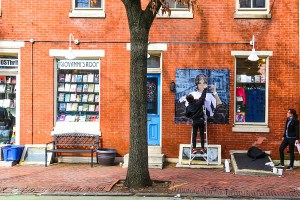Off the Cuff
It may seem like an odd reaction to the verdicts in the City Hall trial — especially coming from me — but I’m not at all depressed. Strangely, I feel relieved to have it officially established that John Street’s administration put the city up for sale. I’m even hopeful, cautiously hopeful, that maybe we’ve come close to the breaking point — given the exposure of just how corrupt our government is — and are ready to do something about it. This is not to say that our indigenous political culture can change overnight. But now that there’s no hiding behind an ongoing trial, the challenge of change sits where it should: squarely on all of us. Do we care enough to do something about it, or will we allow things to go on as they have for at least a century?
The greatest risk is that we simply try to move on. That would please John Street, certainly, and Mark Schweiker, head of the Chamber of Commerce, who says he hopes the end of the trial means the end of bad publicity for the city. Councilwoman Jannie Blackwell doesn’t seem to get what all the fuss is about — pay-to-play and other ethics reforms are not on her to-do list. Those attitudes scare me. They’re not only selfish, but also shortsighted and self-defeating. The only way to truly move on from our latest round of corruption is to change the culture that fosters it. Everyone outside of Philadelphia is well aware of how we operate, and the city cannot come back to any level of vibrancy unless we change that perception.
This is not simply a matter of national headlines; anyone who has tried to conduct business with this city receives an immediate tutorial on what is required. Recently I was in Boston, and within 24 hours I got an earful on my hometown from two businessmen. At a reception for that city’s movers and shakers, I found myself talking to a power broker involved in a wide range of businesses; he told me about coming to Philadelphia several years ago to look into concessions at our airport. Sure enough, at the very first meeting he had with a mid-level city official, there were three shakedown thugs sitting in. They made it patently clear exactly what was required to get the deal — and he had to make a decision on the spot. Enraged, he went home with a very succinct view on doing business with Philadelphia: never again. For the past two years, he’s been spreading the word on how we operate, and warning others to stay away.
The next night, I had a drink with Jeff Rhodes, a native Philadelphian who moved to Chicago three decades ago to pursue a successful career in real estate development. His companies have worked in some 30 cities and developed the Four Seasons and 1 and 2 Logan Square. Rhodes moved back here in 1999 and says it became crystal clear a year ago, as he sat in on meetings on the development of the Girard Trust property on Market Street, “that the whole game here is about who you know and the flow of money. People say it’s not different here than in other major cities, but that’s not true.”
None of this is surprising. Yet if we have the idea that we can move on from the latest exposure of corruption without pointedly changing the way our politicians operate, we are disastrously naïve. The ball is in our court — all of us who live or work in Philadelphia and care about the city. The system has to change, and for that to happen, we have to stand up and keep the heat on until it does. I really don’t want to believe what journalist Lincoln Steffens said a hundred years ago, that Philadelphia is, still, “corrupt and contented.” Which brings us, once again, to the essential question: Do we care enough to change it?


